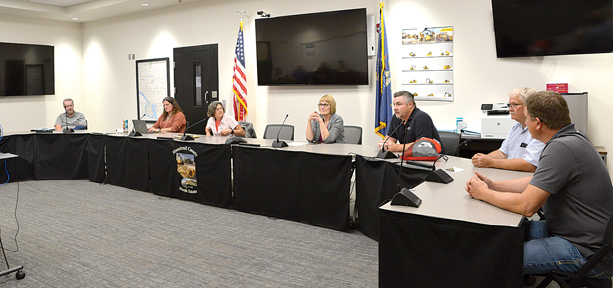ND Association Of Counties Tour Stops In Stanley

Board members from the ND Association of Counties were in Stanley on Thursday, July 31. They toured the many county facilities in Stanley before they held a listening session with the Mountrail County Commissioners and County Officials in the afternoon at the courthouse. County Commissioners Trudy Ruland and Joan Hollekim serve on the ND Association of Counties with Ruland the current board president and Hollekim the County Commissioners Association president.
Executive Director Aaron Birst said that the best part of his job is meeting with the counties inside their own comfort zones. It allows them to hear what is going right or wrong, as well as the challenges that counties face.
One of the biggest challenges this year for all political subdivisions will be the property tax legislation that places a 3% cap on increases. While the legislation was designed to provide tax relief, the way it was written will see those cities, counties and schools putting mill levies back in place that they have covered before within the general fund budget. Because of the way the legislation was written, many will need to do so because if they do not include them in the levy now, they will be unavailable in the future. For Mountrail County, they have often covered many of the levies with oil and gas revenue and reserves, but as they look to the future, they know they many need those levies to be back in place.
Birst said that is unfortunately the case, noting that caps do not usually work. Dipping into reserves will not last when economic conditions change. He said he knows there will be tough conversations with the legislature and governor as they see the way the legislative action plays out in this year’s budgeting across the state.
Mountrail County levied 1.21 mills in 2024. There are a number of mill levies that may come back on this year as they look at their new budget, potentially up to 11.73 mills. They continue to look at how the legislation and needs will balance. Birst noted that counties like Mountrail County that have been responsible and conservative in their levies are all being faced with these challenges. The county has worked to decrease their mill levies over the past years. For example, the county’s mill levy was at 46.91 mills in 2016, 40.21 in 2017, 41.42 in 2018 and 32.34 in 2019.
Also impacted will be the public health units. Upper Missouri District Health Unit may be requesting over that 3% increase simply because of a loss of federal funding that was figured into their original budget.
Mountrail County Planning & Zoning Administrator discussed the county’s moratorium on data centers and battery storage facilities as they continue to draft the ordinances moving forward. The county is working on those ordinances to assure that there will be orderly development and clear definitions of what is expected if these facilities are built in Mountrail County. There are concerns about the impacts and they want to make sure that they also address the concerns of citizens that may be impacted by these developments. Their next meeting was scheduled for Tuesday, Aug. 4.
Department heads also discussed the challenges of hiring and retaining staff. They discussed the changes in the NDPERS system. They noted that Mountrail County has worked hard on their salary schedules to encourage and reward loyalty. County Commissioner Ruland said that her job is made easier because of the knowledgeable and dedicated staff within Mountrail County.
Department heads and officials also discussed the transition to new software systems, the potential needs for more regional services offerings, mental health and addiction affects in both the correctiond department and human services, and other issues that affect county government.
Birst said that the NDACo is planning a property tax workshop at their convention in October. While budgets for the coming year will have been approved, he says the workshop will serve as an opportunity to share the lessons learned in this year’s budget process.
